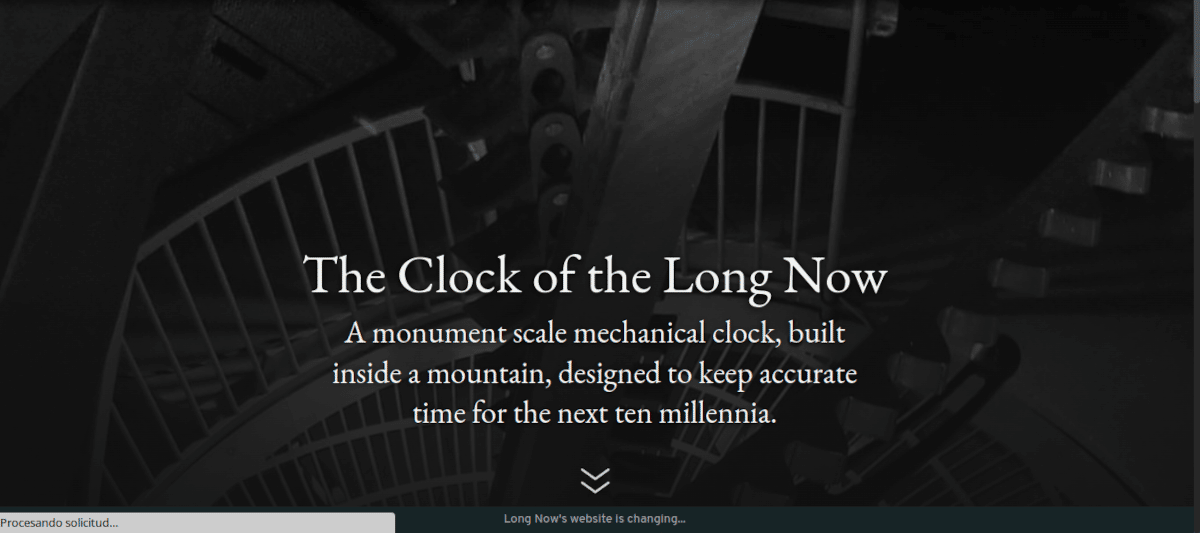
The slowest computer in the world will operate a clock destined to last 10000 years
With a previous article I told you the story of what until now is the fastest computer in the world. Now we are going to see the history of the one that according to Google is slower than, curiously, they share the same pioneer.
The slowest computer in the world
Tel Aviv University awards the Dan David Award every year, which is divided into three categories; past, present and future. In the 2002 edition, the winner in the "Present" category went to Dr. Daniel Hill, the first to create a computer using the parallel processing technology now used by supercomputers around the world. In the early 1985s, Hill showed that it was possible for a computer to run multiple processors in parallel. It was in 64000, while working on his Ph.D., that he built for a private company one that used XNUMX processors.
However, when receiving the award, Hill seemed to have lost interest in the subject.
Parallel computing has become a very common form of computing, so as far as I'm concerned, the topic has been exhausted.
All my contribution to this field was to prove that parallel computing was quite simple and not as complicated as previously thought.
The 10000 year clock
In 1996, the Long Now fund was created to finance the construction of a 20-meter clock high on the summit of Serpent Mountain in Great Basin National Park in the Nevada desert. The mountain had already been acquired by a special fund. established by Mitch Kapor, founder of the defunct software company Lotus, the Jay Walker family, creators of Priceline, and Bill Joy, founder of Sun Microsystem. This mountain was chosen because its summit rises to a height of 3.000 meters and is surrounded by a forest of ancient pine trees, some of which are over 4.900 years old.
At the time of receiving the award, Hill was building a prototype of such a clock, destined to function for no less than 10000 years.. His plans included building it entirely out of bronze, a material known to man for thousands of years. This clock will be controlled by the slowest computer in the world that can work with 5 digits (Remember that it has to display the date after the year 10000) and will be operated by what is described as a huge, bulky and precise mechanical movement. The computer will be responsible for an accuracy of one day every 20000 years.
But what is it for?
It is part of a project of the Long Now Foundation, a non-profit organization that seeks to encourage (Very) long-term thinking. To what they call "civilization scale."
The clock, which has not been finished yet, is called «Clock of the length now» and as I said above, it will have the scale of a monument, it will be built inside a mountain and it will be designed to keep accurate time for the next ten millennia. When it is up and running it will require minimal maintenance and will run on mechanical energy harvested from sunlight and from people visiting it.
The Clock will keep time with astronomical and calendrical displays and a bell generator designed by composer Brian Eno that will play more than 3,5 million unique sequences of chimes, one for each day the Clock is visited for the next 10.000 years.
Ten thousand years is roughly the age of modern civilization, so the clock will measure a civilization's future equal to its past. This assumes that our civilization is in the middle of whatever journey we are on, which the promoters of the project describe as a "show of optimism"
From the project website
Why would someone build a clock inside a mountain in the hope that it would chime for 10.000 years?
Part of the answer: just for people to ask this question, and having asked it, goading themselves into conjuring up notions of generations and millennia. If you have a clock ticking for 10,000 years, what kinds of questions and projects on a generational scale will it suggest? If a clock can keep ticking for ten millennia, shouldn't we make sure our civilization does too? If The Clock is still ticking after we're long dead, why not try other projects that require future generations to finish?
The bigger question is, as virologist Jonas Salk once asked, "Are we being good ancestors?"